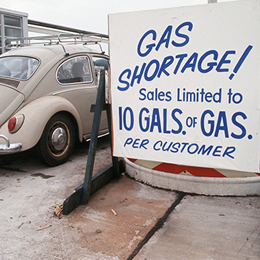1973 Oil crisis
 Gas Shortage Sign in Connecticut During Energy Crisis | |
| Date | October 1973 - March 1974 |
|---|---|
| Perpetrators | Bilderberg/1973 |
| Description | A huge rise in the price of oil, quite probably instituted by the actions of the Bilderberg group. |
The Oil crisis (or Oil shock) was a sudden increase in the price of crude oil. The most significant such event was in 1973.[1] The official narrative is that this was a shock to the oil companies, resulting from the outbreak of the Yom Kippur war. However, this does not fir with leaked documents from the 1973 Bilderberg, which suggest reveal that the possibility of a huge price rise was anticipated by many of the oil executives there.
Contents
Official narrative
Wikipedia's article starts by stating "The 1973 oil crisis began in October 1973", and it avoids the possibility that it was a planned event. A 2011 Guardian rendering of the official narrative states that "The decision to boycott America and punish the west in response to support for Israel in the Yom Kippur war against Egypt led the price of crude to rise from $3 per barrel to $12 by 1974." As of 2016, there is still no admission that the oil 'crisis' was in fact no shock to the oil CEOs who discussed the idea a few months before it happened.[1]
An alternative explanation that fits the leaks from Bilderberg
The fact that the May 1973 Bilderberg was attended by many CEOs of the major oil companies and that documents reveal they were discussing how to handle an oil price rise of 400% seems like a rather extraordinary coincidence.[1]
Sheikh Yamani has stated that he "is 100% sure that the Americans were behind the increase in the price of oil" back in 1973 and 1974. He adds that "they had borrowed a lot of money and they needed a high oil price to save them."[2] If his suspicions are correct then the Yom Kippur war of October 1973 was an instrument to force US friendly oil Sheikhs into a scapegoat position, one that would disguise the financial motives of the oil executives. Bichler, Rowley and Nitzan [3] come to this conclusion, stating that "Middle Eastern wars were the instrument of oil crises" (rather than their cause) and see petrodollar profits as power-grab of what was later termed "a supranational deep state" (Peter Dale Scott) or "the cabal" (Mark Gorton). The 'crisis' flooded Saudi business men (like the Bin Laden family) with petrodollars which financed the Safari Club and the BCCI - often in an efford to promote the Muslim cause.[4][5]
Impacts
The high energy prices were clearly good for oil companies, especially those who had advance warning of the event and made suitable plans. They facilitated the deconstruction of the UK's manufacturing base, but sped up development of the North Sea oil industry, allowing the UK to eventually become a net exporter.[1]
References
- ↑ a b c d https://www.theguardian.com/environment/2011/mar/03/1970s-oil-price-shock
- ↑ http://www.deepblacklies.co.uk/bilderberg_blurb.htm
- ↑ Bichler, Shimshon and Nitzan, Jonathan and Rowley, Robin. (1989) The Armadollar-Petrodollar Coalition - Demise or new Order? Working Papers (Part 4). Department of Economics. McGill University. Montreal. Vol. 89. No. 11. pp. 1-63. http://bnarchives.yorku.ca/135/01/890101RBN_ADPD_Coalition_Demise_or_New_Order.pdf
- ↑ Lucy Komisar. "The BCCI Game: Banking on America, Banking on Jihad", In: A Game as Old as Empire (2007) Berrett-Koehler, San Francisco ISBN, accessed Nov. 14, 2014, http://www.truth-out.org/archive/item/69782:ties-between-the-bush-family-and-osama-bin-laden
- ↑ Lucy Komisar. "The Evidence Is There: It's Time for Congress to Investigate the Ties Between the Bush Family and Osama bin Laden", IPS News April 4, 2007, http://www.alternet.org/story/50156/the_evidence_is_there%3A_it%C3%A2%E2%82%AC%E2%84%A2s_time_for_congress_to_investigate_the_ties_between_the_bush_family_and_osama_bin_laden